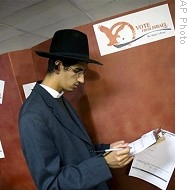VOA标准英语10月-Economy, Security Top Concerns of US Voters in Is(在线收听)
 |
| An American voter at a ballot station in Jerusalem, 28 Oct 2008 |
Naomi Katz, an American who moved to Israel from Philadelphia 36 years ago waits in a long line to enter a crowded room that serves as a makeshift polling station in West Jerusalem. She says getting her absentee ballot in has not been easy.
"Not with the surroundings, not with this room! But certainly as I just received my ballot today, I could never have mailed it in time," she said. "Thank goodness it is here, so I can drop my ballot off because I want to express my opinion."
For Katz, like many of the voters casting absentee ballots from Israel, the economy and security are top concerns.
"Although I am an Israeli now, I am still an American and I feel that what happens to America is important for me," she said. "I hope the next president understands what happens here and how this country is endangered, and will protect us. I am very worried about it because we are in a very vulnerable position."
Many Americans who have immigrated to Israel maintain financial links to home. To most Americans, the topics of a nuclear Iran and militant Islamic threats from the Palestinian territories are distant foreign policy issues.
The chairman of the group Republicans Abroad in Israel, Kori Bardash, says that for these Americans the threats are a backyard concern.
"An American living in Israel really is on the front line in this war against terror that America is in its own war against," Bardash said. "With shared values, shared interests, an American in Israel really is focusing on those important issues."
John McCain and Barack Obama have both vowed staunch support for Israel and pledged to help protect its security. But voters here are split on who they believe will do more for the Jewish state.
The status of Jerusalem is a deciding factor for a number of voters interviewed.
In a June speech to the American Israel Public Affairs Committee, a pro-Israel lobbying group in Washington, Obama called for Jerusalem to remain the undivided capital of Israel. But some voters here were angered when Obama's campaign later said he believes it is an issue to be negotiated with the Palestinians in final status talks.
One voter from the U.S. state of Tennessee says he distrusts Obama's statements on Jerusalem.
"What can you take from that? You do not know what to believe," he said. "He says both ways. So, it is anybody's guess on it."
Helping Americans in Israel cast their ballots is a group called votefromisrael.org, founded by Shimon Greenspan, a native of Long Beach, California. He says the group's goal is to get as many of the 125,000 eligible voters in Israel to get their absentee ballots in.
"Very often, due to the bureaucracy involved, a lot of people do not know that they can still vote regardless of whether or not they got their official ballot," Greenspan said. "There is a federal write-in ballot that many people could use, but they do not know about it. One of the things we are trying to do is get the word out about this ballot and let people know that it exists."
U.S. voter outreach programs like Greenspan's are virtually non-existent in the Palestinian territories, where U.S. citizens interviewed often said they are not aware of mail-in voting procedures and mobile services offered by the U.S. consulate.
In the West Bank village of Jirjilia, Rateb Odeh Ali, a naturalized American citizen and retired storekeeper from the U.S. state of Illinois, says he will not vote. He says getting to the U.S. Consulate in Jerusalem is impossible since Israeli soldiers will not let him past the checkpoints into the city.
"It is too hard to go," he said. "I should have a permit from the Israelis and that is too hard [to obtain]."
Israel has built a security barrier and restricted movement by Palestinians to prevent terrorist attacks.
For Odeh Ali, his U.S. passport is not enough to get him through. Driving several hours to the U.S. Embassy in Amman, Jordan, is also not an option for him. He says he is unhappy because as an American citizen, it is his right to vote. He says he is being prevented from exercising that right.
Jirjilia sits on a hilltop, its streets lined with lavish homes built by American retirees - people who were born here, immigrated to the U.S., became naturalized U.S. citizens, and returned after retiring.
Izhaq Odeh, 68, a retired grocer also from the U.S. state of Illinois, says that if he could get his ballot in, he would vote for Obama, despite the Democratic candidate's support for Israel.
"Obama really is fair for everybody, but McCain has gone too much to the right, which is the same thing like Bush," he said. "As an American citizen, I would not trust him."
His sentiments reflect those of many Palestinians in the West Bank, where Barack Obama has developed a following. Without the knowledge or means to get their absentee ballots in, the opinions of many Palestinian-Americans will go uncounted.